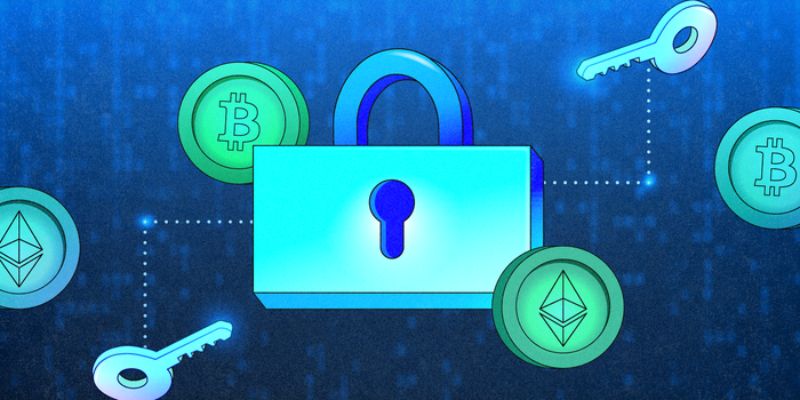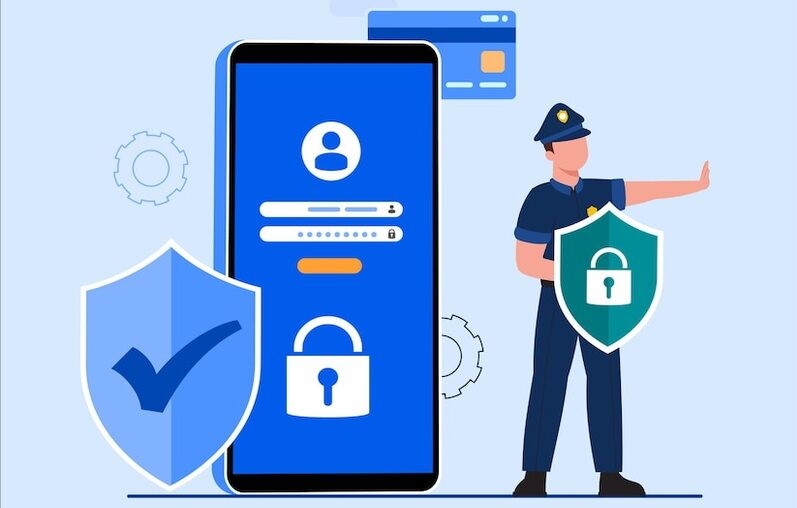As your go-to expert, I need to share an urgent message: Your digital coins can fall prey to savvy hackers if you dismiss cryptocurrency security issues. It’s not just about being smart; it’s about staying ahead. Hard-earned cash vanishes in a blink due to exchange hacks and vulnerabilities that are all too common. And let’s not overlook the sharp spikes in digital thefts and tricky smart contract flaws that even the best of us can miss. Keep reading, and I’ll equip you with the knowledge and defenses you need to protect your virtual treasure trove against the constant threats lurking in the shadows of the digital realm.
Understanding the Threat Landscape in Cryptocurrency
Common Types of Exchange Hacks and Blockchain Vulnerabilities
Hackers love crypto. It’s like a giant digital treasure waiting for them. They use sneaky tricks to break into places where people trade or keep crypto—these places are exchanges. Now, exchanges are getting smarter but so are the hackers. They find weak spots in the exchange’s armor to sneak in. Here’s how they do it. They might send a ton of traffic to stop the exchange from working right. This mess up is called a DDoS attack. Another trick they use is to find a small mistake in the exchange’s code. They wiggle in through this hole and mess up the whole system. These are just a couple of ways they do their dirty work.
For blockchain, this is the tech that keeps your crypto safe. But, it’s not perfect. Hackers look for bugs or weak spots to get in. Sometimes, people who made the blockchain might miss something or rush and not build it super strong. That’s enough for a hacker to get in and break the rules without anyone knowing at first.
The Rise of Digital Currency Theft and Smart Contract Flaws
We all hear how much money crypto can make. But with big money comes big thieves. Digital crypto theft is climbing up quickly. Hackers are not just stealing from one person. They hit big, like grabbing lots of money from many people at once. It’s scary stuff, but we need to talk about it.
Smart contracts are super cool because they are like robot promises that do stuff automatically when certain rules are met. But, they are not always made right. There might be a poor line of code, and hackers love this. One wrong line can mean saying bye to your crypto. Biggest problem? Once your crypto is gone, getting it back is really hard, or maybe even impossible.
Security is king in crypto! It’s about being ready before things go wrong, like putting on your seatbelt before driving. Start with keeping your crypto wallet thick locked. Just like you wouldn’t share your bank PIN, keep your crypto keys to yourself. Always double-check where you send your money, and don’t click suspicious links. Get the best locks for your crypto, like two-factor authentication, and use a hardware wallet, one that you can touch and keep off the internet when you’re not using it.
My job is to help you keep your digital gold safe from these new-age pirates. It’s a wild sea out there, but with a solid ship and good maps, we can dodge those cannonballs and bury our treasure where no one can find it. Keep your eyes peeled, mateys. The next adventure is keeping our loot safe, and together, we’ll make sure no hacker can ever get a piece of our digital gold.
Proactive Defense: Tools and Strategies to Prevent Crypto Theft
Harnessing Two-Factor Authentication and Hardware Wallet Protection
Two-factor authentication (2FA) boosts security for your crypto account. It’s like a double lock. No one gets in unless they have both keys. Use this alongside a hardware wallet for a strong defense. Hardware wallets keep your crypto offline and safe. Away from hackers who lurk online. They can’t steal what they can’t reach. Be sure to keep the physical device secure. Treat it like treasure. After all, it holds your digital gold.
To set up 2FA, choose a reliable app. Avoid using SMS if you can. Apps like Google Authenticator work well. They give you a code. Enter this when logging in or making a transaction. A hacker needs your physical phone to get in. That’s tough for them to do. For your hardware wallet, pick a trusted brand. Look for ones with good reviews. Think Ledger or Trezor.
Countering Phishing and SIM Swapping: Best Practices for Crypto Holders
Phishing attacks trick you into giving out personal info. They can be emails or websites. They look real but are fake. To stop this, check emails carefully. Look at the sender’s details. If anything seems off, don’t click. Don’t share personal details online either. Hackers can’t use what they don’t know.
SIM swapping is a sly move by hackers. They pretend to be you and get your phone number transferred to their SIM card. Then, they intercept your messages. To guard against this, keep your phone info private. Also, use an app for 2FA, not SMS. Contact your phone carrier. They can add extra security to your account. They might ask for a PIN or password for changes to your service.
Staying safe in the crypto world isn’t hard. But you must be smart and careful. Use these tools and rules to keep hackers away. Don’t let them get their hands on your digital gold.
The Technical Front: Securing Your Cryptocurrency Transactions
Implementing Advanced Encryption and Exploring Multisignature Wallets
Imagine your crypto as treasure. You want to keep it safe, right? So we use advanced encryption. It’s like a secret code that only you can read. No one else can crack it easily. It changes plain info into puzzling text. When you trade crypto, encryption keeps your data safe.
But what is encryption in blockchain? Simply put, it turns your sensitive data into complex codes. So even if someone gets it, they can’t read it. Blockchains use this to protect your coins. With good encryption, it’s tough for hackers to steal.
Now, multisignature wallets. Think of these like a safe needing several keys to open. Not just one person can unlock it — you need a few. This way, no single person can run off with the cash. They’re great for groups using a shared fund.
Multisignature wallets need more than one private key. They can help big time if you share a wallet with others. Each person has a key. To do a transaction, more than one key is needed.
The Role of Cold Storage in Safeguarding Digital Assets
Next, let’s talk about cold storage. What is cold storage for digital assets? It’s a way to store your coins offline. No net means no hacking. Think of it like keeping your jewels in a safe, not a drawer.
Hard drives or USBs can act as cold storage. You keep your crypto offline so bad guys can’t reach it. This is safer than online or “hot” wallets. Here, the risk of theft drops a lot.
But remember, protect your cold storage, too. It needs to be in a safe spot where you won’t lose it. And damage from water or fire is still a risk.
Wrap it up, and what do we get? Crypto wallet security is vital. You’d use a strong padlock for your treasure chest, right? It’s the same with crypto. Encryption makes your data tough to crack. Multisignature wallets mean you need more keys to spend. Cold storage keeps your coins far from hackers.
Remember, the key is to stay ahead of the bad guys. Your digital gold needs the best locks out there. So make sure you’re using all these tools. They’re like a shield for your treasure.
Regulatory Compliance and Security Measures
Navigating Cryptocurrency Regulation: KYC and AML Protocols
We are diving deep into the world of crypto rules. Think of crypto like a game where you must know the rules to win. First off, KYC, or Know Your Customer, is a big deal. It stops the bad guys from using crypto for wrong things. Everyone must show ID to join a crypto game, like when kids prove they are old enough for a ride at the fair.
AML stands for Anti-Money Laundering. It is like a filter that keeps dirty money from getting clean through crypto. Both KYC and AML help keep everything fair and safe for us all. They stop folks who try to cheat in the game of crypto.
Protecting Against Investment Scams and Unsecure Trading Practices
Now let’s talk about how to stay safe when trading crypto. Scams are out there, trying to trick us. This is like when someone tries to sell you fake gold. You must stay sharp. Always look out for Ponzi schemes and rug pulls in crypto. Ponzi schemes promise big money fast but pay old investors with new ones’ cash. Rug pulls are when traders yank all the money out and leave you with nothing.
Think of trading crypto like trading cards. You wouldn’t trade your best cards with just anyone. You pick someone you trust. The same goes for crypto. Secure trading practices are a must. We keep our digital gold safe by trading smart, just like how kids protect their favorite cards in plastic sleeves.
Always use two-factor authentication when you can. It’s like a special code that only you know. It keeps your crypto wallet safer. Also, look into hardware wallets if you’re keeping lots of digital coins. They are like super-safe banks in your pocket for your crypto.
Watch out for phishing. Phishing tricks you into giving away secrets about your crypto, like a sneaky spy. And SIM swapping? That’s when someone pretends to be you to steal your phone number and then your crypto. We beat these tricks by learning all their sneaky ways and by always being extra careful with our info.
When we stick to the rules and stay smart, we can keep our crypto safe from the sneaky thieves. Remember, never give out your secret keys. And think of multisignature wallets like a team-up. You need more than one key to open them up, which means better safety for your crypto.
Playing it safe in crypto means knowing the rules and knowing how to stay away from scams. It’s about making sure you play the game in the best way, like having the right gear and moves to win. Stick with me, and we’ll keep your digital gold as safe as a treasure chest with a dragon on guard.
In this post, we unpacked the risks facing your digital coins. We explored the ways hackers attack and flaws in smart contracts. I’ve shared key strategies to shield your crypto from theft, like using two-step checks and real tough wallets. We tackled tricks like phishing and SIM swaps, too.
Tech stuff matters as well. With top-notch code locks and multi-sign wallets, you can keep your transactions safe. Remember, cold storage is a solid friend for your coins.
Lastly, we covered legal rules like KYC and AML, which help fight scams and unsafe trades. To cap it all, knowing the dangers and using smart tools and habits can protect your crypto wealth. Stay sharp and always use the best shields for your digital treasure. That’s how you win the crypto security game.
Q&A :
What are the most common security issues with cryptocurrency?
Cryptocurrencies, while offering a high level of security through blockchain technology, are still susceptible to various security issues. Common concerns include exchange vulnerabilities, where hackers target cryptocurrency exchanges to steal user funds, and phishing attacks, which trick users into revealing their private keys or login details. Wallet security is another critical issue, as insecure storage of cryptocurrency can lead to theft. Additionally, smart contract flaws can be exploited, and the immutable nature of blockchains means stolen funds are often unrecoverable.
How can I protect my cryptocurrency from theft?
Protecting your cryptocurrency starts with securing your digital wallets by using strong, unique passwords and enabling two-factor authentication. Keeping the majority of your assets in cold storage (offline wallets) can greatly reduce the risk of theft. Be cautious of phishing attempts by double-checking URLs and email senders. Also, make sure your computer’s antivirus and antimalware software are up-to-date, and consider using a dedicated and secure computer or smartphone for all your crypto transactions.
Are hardware wallets secure for storing cryptocurrency?
Hardware wallets are generally considered one of the safest options for storing cryptocurrency. They store your private keys offline, making them immune to online hacking attempts. However, users should buy hardware wallets from reputable manufacturers and ensure their firmware is regularly updated. Additionally, the physical security of the hardware wallet is essential; it should be stored in a secure location to prevent theft or physical tampering.
Is cryptocurrency safe from cyber attacks?
While no system can be 100% secure, the underlying blockchain technology of cryptocurrencies offers a high degree of resistance to cyber attacks. The decentralized and encrypted nature of blockchains makes it challenging for attackers to gain control or alter the transaction records. However, other components like exchanges, wallets, and user practices can be vulnerable. Staying informed about the latest security measures and being vigilant against potential threats are key to keeping crypto assets safe.
What should I do if I suspect a cryptocurrency security breach?
If you suspect a cryptocurrency security breach, act immediately. Disconnect your devices from the internet to halt any ongoing unauthorized access. Change the passwords of all related accounts, and consider moving your funds to a new, secure wallet. Report the breach to the relevant exchange, crypto wallet service, and authorities, if appropriate. It’s also crucial to analyze how the breach occurred to prevent future incidents, which might involve updating security protocols or getting professional cybersecurity assistance.




